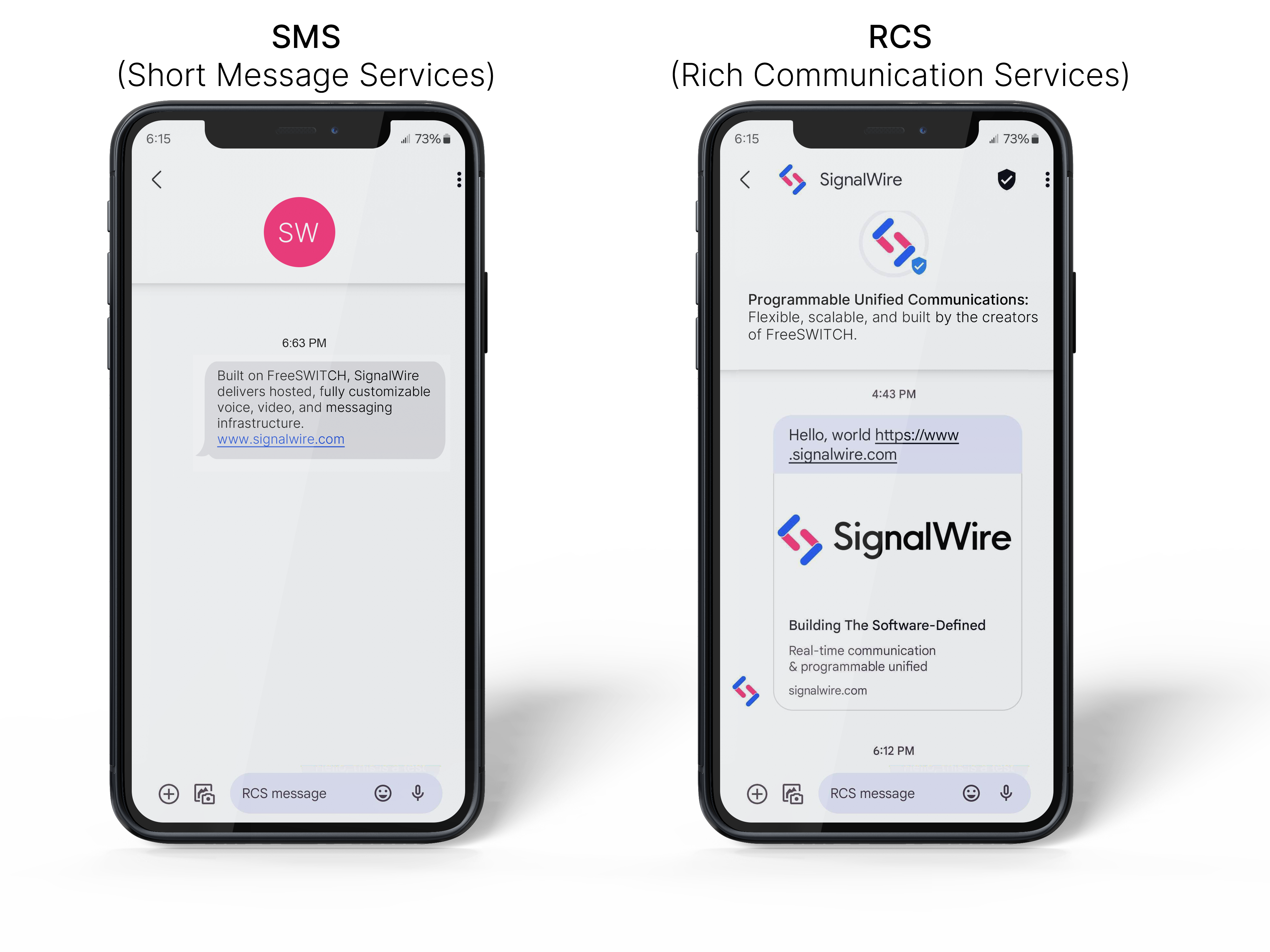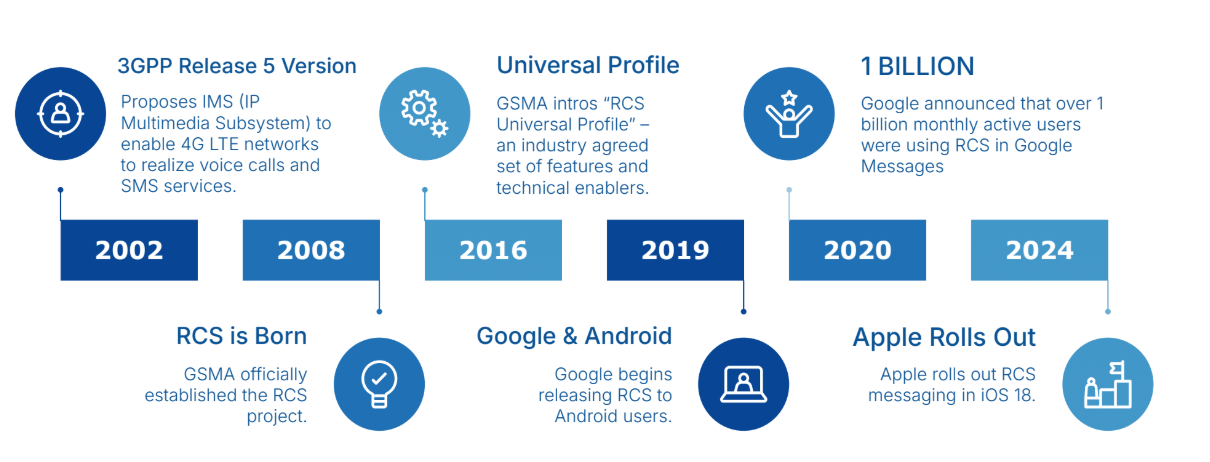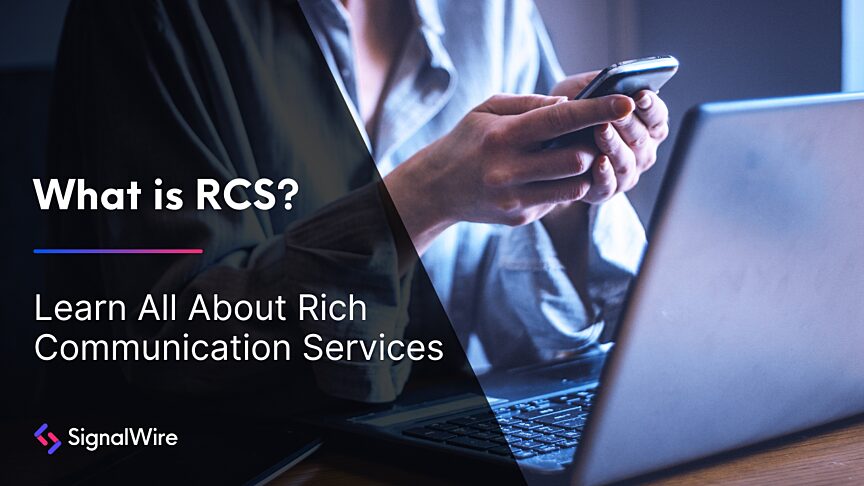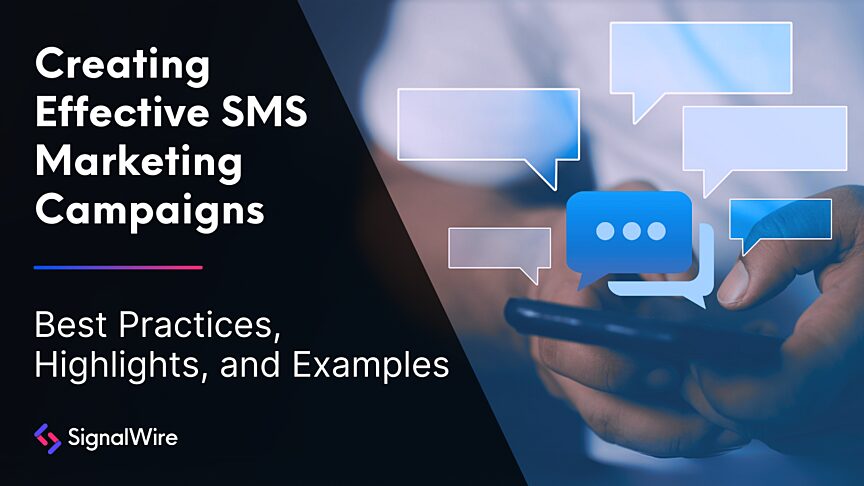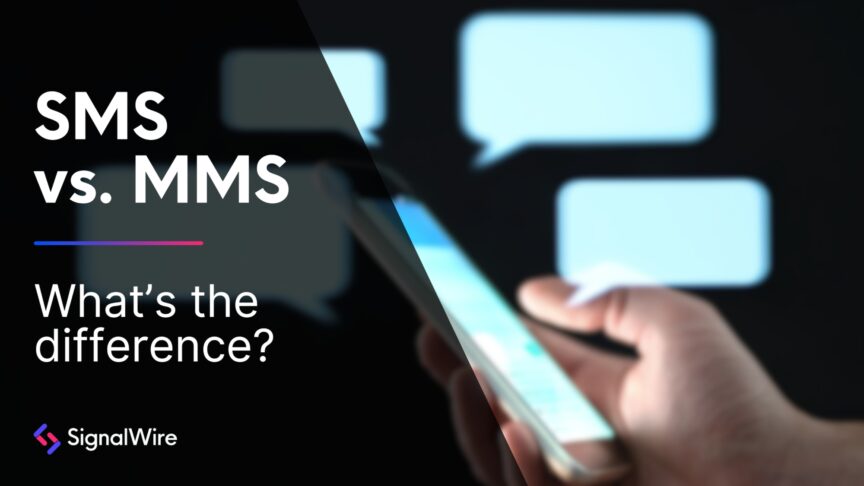Rich Communication Services (RCS) is the next evolution of business messaging, offering richer media, verified sender identities, delivery confirmation to the handset, and interactive experiences that go far beyond SMS and MMS. This article answers the most common questions about RCS adoption, device and carrier support, fallback behavior, compliance requirements, pricing, and how RCS Business Messaging (RBM) works in real-world deployments.
Understanding the Difference Between RCS and SMS Messages
What is RCS?
Rich Communication Services (RCS) is the next generation of messaging technology. Set to redefine the way businesses interact with their customers, RCS combines the best of traditional SMS with rich media, interactive features, and advanced delivery metrics, making it simpler to deliver more engaging and personalized customer experiences. Unlike SMS and MMS, RCS offers features like verified sender IDs, typing indicators, read receipts, and the ability to share high-quality media.
SignalWire’s recent LIVEWire webinar, The Future of Business Messaging: Why RCS, gathered messaging experts to discuss the current state of RCS, its potential for business messaging, and how it differs from existing messaging solutions. The session also included a Q&A with Steve Starr, SignalWire’s Director of Carrier Operations.
Recent changes to the messaging landscape
During the webinar, we explored what makes RCS such a transformative technology, sharing insights into RCS’s evolution, its growing adoption by Google, Android, and Apple, and why businesses should start preparing now for its widespread rollout.
While RCS has been around since 2008, adoption has accelerated recently thanks to significant efforts to standardize RCS features across devices and networks. In 2019, Google embraced RCS as a competitor to Apple’s iMessage, rolling it out widely for Android devices.
In 2024, Apple joined the RCS movement by introducing support in iOS 18, making it possible for the first time to bridge the gap between Apple and Android messaging users. This growing alignment among tech giants signals a pivotal moment for RCS adoption, particularly in business messaging.
Below, you’ll find the questions asked and answered during the LIVEWire.
Frequently asked questions
Is RCS technology supported by all smartphones?
Most modern smartphones running Android or iOS 18+ support RCS. For Apple devices, users need iOS 18 or later for compatibility. However, certain phones with embedded operating systems typically do not support RCS.
For end users, RCS is primarily tied to their mobile device and carrier, but its integration with iOS and Android allows it to extend functionality to other devices. While this means RCS supports cross-device compatibility, it’s still dependent on the phone itself being connected to the carrier network and actively using the service.
What makes RCS delivery receipts better than SMS?
Delivery receipts with SMS can be inconsistent, often indicating delivery only to the carrier. RCS eliminates this uncertainty by confirming delivery to the recipient’s handset and providing additional insights such as read receipts and typing indicators. This makes RCS a more reliable tool for tracking messaging interactions.
Does RCS work in Canada or only in the US?
RCS is available in both the US and Canada. Canadian carriers have started rolling out support over the past several months, though adoption levels may vary depending on the carrier and device capabilities.
What happens if you send an RCS message to a device that doesn’t support it?
If the recipient's device or network does not support RCS, the message will automatically downscale to SMS or MMS. This means that only the message and media will be delivered, and RCS-specific features cannot be utilized.
Does RCS require registration with The Campaign Registry (TCR)?
RCS does not currently require campaign registration through TCR. Agent registration is managed through aggregators and mobile operators similar to short code registrations. However, you should monitor developments as standards may change over time.
If you expect your RCS messages to default to SMS during delivery failure, you will have to register two campaigns, and in this case, one of them would be with The Campaign Registry.
What is an agent in the context of RCS Business Messaging (RBM)?
In RCS and RBM, an agent represents a business's verified identity, combining branding elements like a business name, logo, and campaign details. This verification process ensures customers can trust the sender and recognize messages from legitimate sources.
This is essentially the digital representation of the company sending out messages. Verified agents make it easy for customers to confidently identify the sender, while allowing the company to unlock advanced RCS features such as branded messages and interactive buttons.
To set up an agent, you must go through an approval process involving aggregators, mobile operators, and platforms like Google. This process ensures that only legitimate and trustworthy businesses can leverage the capabilities of RCS, helping to reduce spam and create a more secure messaging environment for end users.
Does RCS include end-to-end encryption and HIPAA compliance?
RCS messages between individuals are encrypted end-to-end. However, RBM is not encrypted end-to-end due to its store-and-forward delivery mechanism. As a result, RBM does not currently meet HIPAA compliance requirements, limiting its suitability for sharing sensitive health information.
Is there any API or message format documentation available for RCS?
Documentation for RCS with SignalWire’s APIs is still in development as the technology continues to evolve. SignalWire plans to share updates as standards and carrier requirements stabilize.
Does RCS need internet or only carrier support?
RCS relies on both carrier support and internet connectivity to deliver its enhanced features.
Can you terminate an RCS message rather than have it fall back to SMS?
For now, RCS will revert back to SMS, and so it’s important to plan accordingly when using features that are only supported by RCS.
Can companies train lists based on delivery receipts from RCS?
Yes, businesses can analyze delivery receipts to segment their audiences, determining which customers should receive RCS versus SMS messages, for more efficient and targeted communication.
How does opt-in compliance work for RCS campaigns?
In the US, opt-in compliance for RCS campaigns aligns closely with 10DLC regulations for SMS. Senders must ensure users have explicitly opted in to receive messages to remain compliant.
Have carriers placed any content restrictions on RCS?
Yes, RCS content restrictions are similar to those for SMS and MMS. For instance, third-party lending, certain types of gambling, and adult content may be restricted. Political messaging also faces stricter guidelines.
What is pricing for RCS, including carrier access fees?
Pricing for RCS is still being negotiated with mobile operators and aggregators. Currently, SignalWire does not charge registration fees for RCS agents, though this may change as the technology evolves (so consider getting registered ASAP!)
How to prepare for the future of business communication
While RCS is still in its early stages of widespread adoption, now is the ideal time to prepare for the coming changes to the messaging landscape. This includes registering RCS agents to establish a verified presence, which can take several weeks due to the approval process involving different entities. Businesses should also start planning on how using RCS features—such as interactive buttons, rich media, and improved analytics—can improve their communication strategies.
Planning your RCS use cases, like marketing campaigns, appointment reminders, or customer support interactions, will keep you ahead as more devices and carriers adopt RCS. When adoption reaches critical mass, you’ll remain competitive in an increasingly interactive messaging environment.
SignalWire has always been at the forefront of the messaging industry and is actively staying ahead of regulations. If you’re looking for experts to keep you informed and navigate the latest RCS changes, sign up here to receive updates from our team. Join our developer community on Discord to stay up-to-date with everything else SignalWire.
Richer, more interactive business communications are just around the corner. While the technology is still evolving, businesses that start preparing to adopt RCS now—by registering agents and exploring use cases—will be one step ahead as more people begin to use it.
